 Petzlover
Petzlover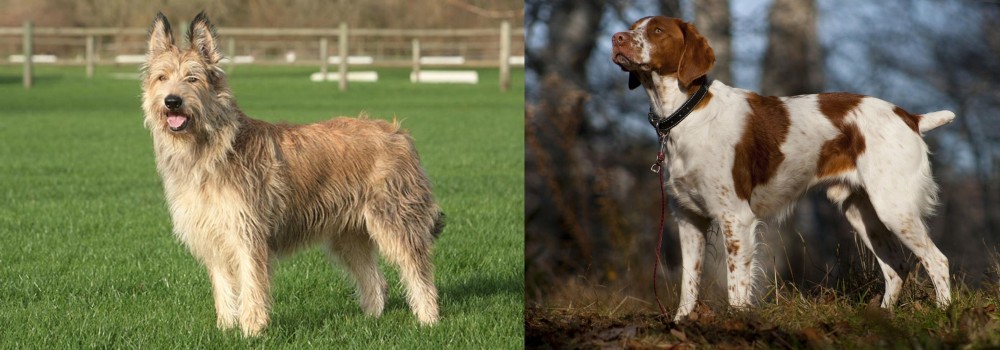 Both Berger Picard and Brittany are originated from France. Berger Picard may grow 13 cm / 6 inches higher than Brittany. Berger Picard may weigh 12 kg / 27 pounds more than Brittany. Both Berger Picard and Brittany has almost same life span. Both Berger Picard and Brittany has almost same litter size. Both Berger Picard and Brittany requires Low Maintenance.
Both Berger Picard and Brittany are originated from France. Berger Picard may grow 13 cm / 6 inches higher than Brittany. Berger Picard may weigh 12 kg / 27 pounds more than Brittany. Both Berger Picard and Brittany has almost same life span. Both Berger Picard and Brittany has almost same litter size. Both Berger Picard and Brittany requires Low Maintenance.
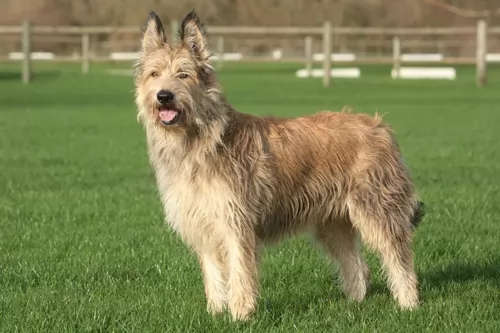 In the Picardie region of northeastern France saw visiting Celts/Franks enter the region along with a shepherd dog. They arrived in the Pas de Calais in 800 AD and might be the oldest shepherd dog of France. Named for Pacardy, the Berger Picard is certainly one of the most ancient of today’s French breeds. Some believe this shepherd comes from the lines of Dutch and Belgian Shepherds, while other insist he is related to the Beauceron and Briard.
In the Picardie region of northeastern France saw visiting Celts/Franks enter the region along with a shepherd dog. They arrived in the Pas de Calais in 800 AD and might be the oldest shepherd dog of France. Named for Pacardy, the Berger Picard is certainly one of the most ancient of today’s French breeds. Some believe this shepherd comes from the lines of Dutch and Belgian Shepherds, while other insist he is related to the Beauceron and Briard.
Never popular as a show dog due to its shaggy appearance, even though it was entered in Frances first dog show in 1863, the breed was almost extinct following the second World War. Currently there are a little under 5000 left in the world with most of them, 3000, in France. The Picard is a good herding dog and loved by the shepherds of the Picardy region. The United Kennel Club recognized the rare breed in 1994, but the AKC did not recognize it until 2016.
The Berger Picard is a loyal, people-oriented dog, good with children and families if socialized as a puppy. In 2006 the Berger Picard Club of America was formed as more and more dogs are being imported from France. There was a genetic study done this year that proposes that 7 breeds of shepherd all descended from a European herding dog that was all over Europe before 1859. This dog was the father of the Berger Picard, the German Shepherd, The Bergamaso Shepherd, the Lupino de Gigante, the Cane Paratore, the Cane da pasore della Lessinia e del Lagorai , and the Pastore d”oropa. After recognition, the Picard was shown for the first time at Krufts in March 2016. They followed that with a best of breed win by Gabby, Guess V.D. Benedicks
 One of the most intense bird dog breeds in existence is the Brittany, bred for hunt. The breed used to be called the Brittany Spaniel, but since the breed is closer to a setter or pointer, that moniker has been dropped. The Brittany is named for the French Province in which they were originally developed. Sometime from the 17th to the 19th centuries, the breed was developed. Images of a very similar dog can be found on 17th century paintings and tapestries. However, the first written description comes from 1850 by a Reverend Davies, describing a hunting episode. The breed was recognized officially in the early part of the 20th century and made a splash at the 1900 Paris Dog Show.
One of the most intense bird dog breeds in existence is the Brittany, bred for hunt. The breed used to be called the Brittany Spaniel, but since the breed is closer to a setter or pointer, that moniker has been dropped. The Brittany is named for the French Province in which they were originally developed. Sometime from the 17th to the 19th centuries, the breed was developed. Images of a very similar dog can be found on 17th century paintings and tapestries. However, the first written description comes from 1850 by a Reverend Davies, describing a hunting episode. The breed was recognized officially in the early part of the 20th century and made a splash at the 1900 Paris Dog Show.
The first official standards were written in about 1907 and the breed was recognized by the American Kennel Club (AKC) in 1934.The Brittany is expected to point to and then retrieve birds and other small ground game. Because the Brittany both points and retrieves they are known in the U.K. as a Hunt, Point and Retrieve breed or an HPR, and they have more Dual Champions than the rest of the AKC Sporting group.
There are actually two types of Brittanys in the minds of many breeders. There is the “French” Brittany and the “American” Brittany. When the breed arrived in the United States in 1931 they became immensely popular in a short period of time. In 1942 American Breeders began the American Brittany Club, rewriting the French standard to fit the dog they knew. Today there are definitely difference between the two sub-sets that can easily be seen. The French dog is smaller than the American dog. The American dog is a runner pacing ahead of the hunter while the French dog works more closely with their human companions. Another visible difference is that the French accept black spotted Brittanys, while in the United States a black spotted coat is considered a fault. Both sub-sets are known for their willingness to follow human directions, their eagerness for the hunt, and their agility and speed.
Unfortunately, the European wars took their toll on this breed as they did on many others. Following the second World War, their numbers in Europe were drastically reduced. The French had stop breeding them altogether during the war. It was in this depleted gene pool that the French agreed to accept the black spotted Brittany. Along with the U.S., Canada also does not recognize the black spotted Brittany.
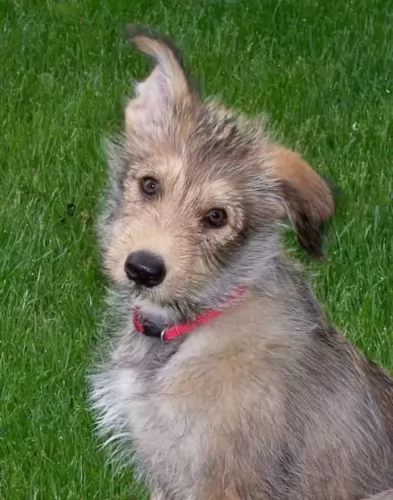 The Berger Picard is a muscular, medium sized, faithful companion. He is especially great with an owner who is athletic and energetic. They have a rugged constitution, slightly longer back, and full tail. The coat is thick, strong and harsh. They are never overweight or bulky. This gives the Berger Picard the look of a mixed breed dog. They have erect ears and thick eyebrows. This lanky looking dog is alert and lively. Movement is efficient, free and tireless. They have strong bones with a sturdy build and a take charge personality.
The Berger Picard is a muscular, medium sized, faithful companion. He is especially great with an owner who is athletic and energetic. They have a rugged constitution, slightly longer back, and full tail. The coat is thick, strong and harsh. They are never overweight or bulky. This gives the Berger Picard the look of a mixed breed dog. They have erect ears and thick eyebrows. This lanky looking dog is alert and lively. Movement is efficient, free and tireless. They have strong bones with a sturdy build and a take charge personality.
They have a strong rectangular head that is not massive. His eyes are oval and medium sized, never round or protruding. Eye color should be dark and never yellow. Cheek muscles are strong, and muzzle is smooth, ending abruptly at the nose. Scissors bite, deep chest and round feet. There should not be any dewclaws on the back legs.
 The Brittany is much like other hunting dogs – pointers and retrievers – in size and stature. He is solid and strong but not heavy. He is compact with an average size head and floppy ears, docked tails or short natural tails, and expressively intelligent looking eyes. He is athletic, energetic, and alert. He has a long, elastic and free gait. The French dog is smaller and the dog with black spots is accepted. The American Brittany is larger and only a tri-color of orange, liver and white is acceptable.
The Brittany is much like other hunting dogs – pointers and retrievers – in size and stature. He is solid and strong but not heavy. He is compact with an average size head and floppy ears, docked tails or short natural tails, and expressively intelligent looking eyes. He is athletic, energetic, and alert. He has a long, elastic and free gait. The French dog is smaller and the dog with black spots is accepted. The American Brittany is larger and only a tri-color of orange, liver and white is acceptable.
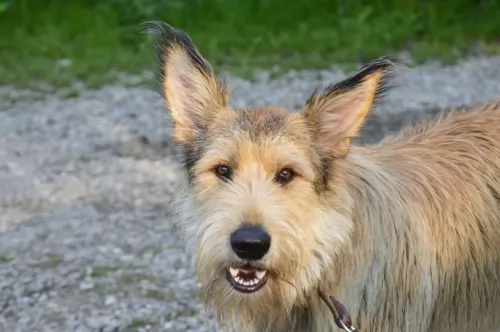 The Berger Picard needs to be a part of a pack with an owner who is clearly the pack leader. This is an intelligent, friendly, and sensitive to harsh voice scolding. They are not easy to train, and you need to be calm and patient when working with him. The Picard has a tendency to be stubborn with an owner who appears to be weak. If raised with or socialized to children and other animals, they will live fine with them. They are best in a rural environment rather than a close neighborhood. They are very quiet dogs, but they need a job and they excel at work.
The Berger Picard needs to be a part of a pack with an owner who is clearly the pack leader. This is an intelligent, friendly, and sensitive to harsh voice scolding. They are not easy to train, and you need to be calm and patient when working with him. The Picard has a tendency to be stubborn with an owner who appears to be weak. If raised with or socialized to children and other animals, they will live fine with them. They are best in a rural environment rather than a close neighborhood. They are very quiet dogs, but they need a job and they excel at work.
 The Brittany is particularly trainable and friendly. They love to play and are sweet-natured. They don’t due well with harsh correction though and a stern look will cause them to wither. Socialize them young or they can become shy around strangers. They are loyal and family oriented. They can easily become attached to their humans.
The Brittany is particularly trainable and friendly. They love to play and are sweet-natured. They don’t due well with harsh correction though and a stern look will cause them to wither. Socialize them young or they can become shy around strangers. They are loyal and family oriented. They can easily become attached to their humans.
 The Berger Picard is not a heavy or extra-large dog, but they still can have hip dysplasia, though it is not nearly as prevalent as it is in larger breeds. Eye infections can present in puppies more than adults and hereditary eye issues such as PRA and RD are all too common. (Progressive Retina Atrophy and Retinal Dysplasia)
The Berger Picard is not a heavy or extra-large dog, but they still can have hip dysplasia, though it is not nearly as prevalent as it is in larger breeds. Eye infections can present in puppies more than adults and hereditary eye issues such as PRA and RD are all too common. (Progressive Retina Atrophy and Retinal Dysplasia)
 The breed is a hardy one and Brittanys are mostly healthy dogs. In Europe 1 in 5 dogs dies of old age and that age is usually 14 or 15 years. They do have a few issues that they may be susceptible to. These would include:
The breed is a hardy one and Brittanys are mostly healthy dogs. In Europe 1 in 5 dogs dies of old age and that age is usually 14 or 15 years. They do have a few issues that they may be susceptible to. These would include:
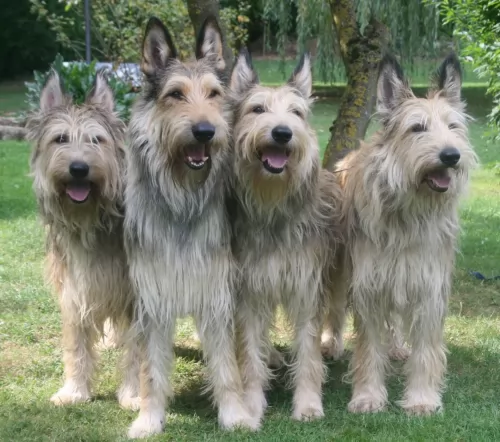 This is an athletic and active breed with a lot of energy. They need a high-quality food that is full of nutrients and not empty calories. Don’t overfeed him as some will have a tendency to become obese. They should be fed twice a day in equal proportions. Treats are good when training but don’t overdo it.
This is an athletic and active breed with a lot of energy. They need a high-quality food that is full of nutrients and not empty calories. Don’t overfeed him as some will have a tendency to become obese. They should be fed twice a day in equal proportions. Treats are good when training but don’t overdo it.
Since the Berger Picard has not been overbred, there are not a lot of genetic disorders in the breed. They do have some
You should have your puppy certified by the Orthopedic Foundation for Animals (OFA) and then the Canine Eye Research Foundation that they do not have these issues and if they do, resolve them. The results of these tests should be published in the OFA registry. This breed is also a participant in the Canine Health Information Center. This means their eyes and hips have been checked and the results published. Their blood is being stored for DNA purposes and one of the following have been evaluated: heart, elbows or thyroid. There is an OFA Berger Picard health survey whose results are available to anyone who asks. This does not track individual dogs but the breed as a whole.
This is a breed that needs a lot of exercise. She likes to swim, take long walks, take runs with you on your bike. They love to jog with you as well. Agility, obedience and any other type of competition will appeal to your Picard. However, don’t expect them to excel at competition because they are not consistent performers. But if they don’t get enough exercise and fun they will become very destructive. Barn hunt and non-competitive herding activities are perfect for the Picard.
 Don’t overfeed your Brittany. Keep him at hunting weight by feeding a half a cup up to 2 cups per day depending on the size of your dog and activity levels. Serve this in two meals not one.
Don’t overfeed your Brittany. Keep him at hunting weight by feeding a half a cup up to 2 cups per day depending on the size of your dog and activity levels. Serve this in two meals not one.
Ears – prone to infections – make sure that you check them and wipe them out routinely to prevent infections.
Hip Dysplasia – bones don’t fit well into joints – this can be genetic or otherwise, causing lameness and arthritis. If severe it can require surgery to correct.
Epilepsy – mild or serious seizures are possible. This can be genetic/hereditary but is set off by an infectious disease of the brain, head injury, poison, tumor, or metabolic disorder. There is no cure, but medication can be very effective.
Hypothyroidism – Low levels of thyroid hormone – can cause drooping eyelids, obesity, lethargy, mental difficulties or irregular heat cycles or all of this. Medication is available as it is for humans but must be taken daily for the rest of the dog’s life
Canine Discoid Lupus Erythematosus – autoimmune disease that is rare in dogs. Cats and humans can also have it. It is a skin disease and does not become the more serious and deadly Systemic Lupus. The Discoid version of this disease causes loss of pigmentation and a scaling on the nose which can then progress to the skin around the ears, eyes and genitals. There could be ulcerated lesions and tissue death in more severe cases. Sun exposure can make the condition worse.
The Brittany is a hunting dog that acts like a pointer but will retrieve fowl and birds in the water or on land. If you don’t hunt, the Brittany can still be your family dog. They need lots of exercise and mental stimulation. They need a job if they are not going to hunt and expect them to be distracted by every bird they see. Try flyball, agility, FAST CAT, field trials and dock diving. They are very task oriented and have boundless energy. They excel at obedience and confirmation as well.